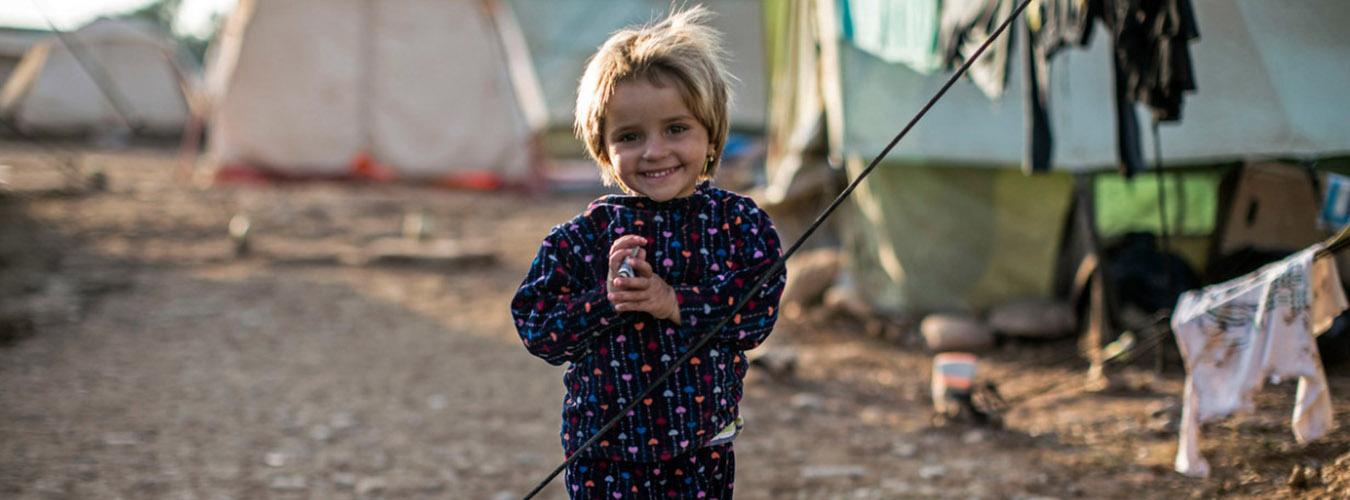NOAH 2023/10/21
HUMANITARIAN AID
Delivering Humanitarian Aid to those in need
The UN's Office for the Coordination of Humanitarian Affairs (OCHA), mandated by the General Assembly, leads global emergency responses in coordination with UN entities. It ensures rapid and coherent disaster response and coordinates international responses to health crises, provides aid to those affected by disasters and conflicts, aids refugees, focuses on child welfare, supports women and girls, offers services and funds for large-scale feeding operations, and helps farmers re-establish production after emergencies, among other tasks.
Deliver Humanitarian Aid

A young girl standing by her tent in the Warga Dalal camp in Zakho, northern Iraq in October 2014, where an estimated 2.8 million people were in need of food and approximately 800.000 people in urgent need of emergency shelter. The United Nations Refugee Agency (UNHCR) delivered supplies to that camp such as tent insulation and flooring which would keep refugees warm in the harsh winter months. OCHA/Iason Athanasiadis
One of the purposes of the United Nations, as stated in its Charter, is "to achieve international co-operation in solving international problems of an economic, social, cultural, or humanitarian character." The UN first did this in the aftermath of the Second World War on the devastated continent of Europe, which it helped to rebuild.
The Organization is now relied upon by the international community to coordinate humanitarian relief of emergencies due to natural and man-made disasters in areas beyond the relief capacity of national authorities alone.
"Each day I wake up in the hope of bringing about change. A change in the life of someone in need." The psychosocial camp counsellor for Atma IDP camp, herself displaced since 2012, visits displaced families every day to talk about their stresses and offer support to children who have lost their parents. ©OCHA
The Office for the Coordination of Humanitarian Affairs (OCHA) of the UN Secretariat is responsible for coordinating responses to emergencies. It does this through the Inter-Agency Standing Committee, whose members include the UN system entities most responsible for providing emergency relief. A coordinated, system-wide approach to humanitarian relief is essential in providing assistance quickly and efficiently to those in need.
OCHA’s mandate stems from General Assembly resolution 46/182 of December 1991, which states: "The leadership role of the Secretary-General is critical and must be strengthened to ensure better preparation for, as well as rapid and coherent response to, natural disasters and other emergencies. This should be achieved through coordinated support for prevention and preparedness measures and the optimal utilization of, inter alia, an inter-agency standing committee, consolidated appeals, a central emergency revolving fund and a register of stand-by capacities."
2020: A year of unprecedented need around the world. CERF met the challenge - allocating a record $900 million, it delivered life-saving assistance in 52 countries with unparalleled speed. CERF provided a record $225 million to 20 underfunded and neglected crises. First ever global pandemic allocation. First ever allocation to NGOs, CERF helped humanitarian partners reach those in greatest need. ©CERF
The UN Central Emergency Response Fund (CERF), managed by OCHA, is one of the fastest and most effective ways to support rapid humanitarian response for people affected by natural disasters and armed conflict. CERF receives voluntary contributions year-round to provide immediate funding for life-saving humanitarian action anywhere in the world.
UN entities with a primary responsibility for delivering humanitarian aid
The United Nations Development Programme (UNDP), the United Nations Refugee Agency (UNHCR), the United Nations Children's Fund (UNICEF), the World Food Programme (WFP) and the United Nations Population Fund (UNFPA) have primary roles in the delivery of relief assistance.
The World Health Organization (WHO) coordinates the response to humanitarian health emergencies.